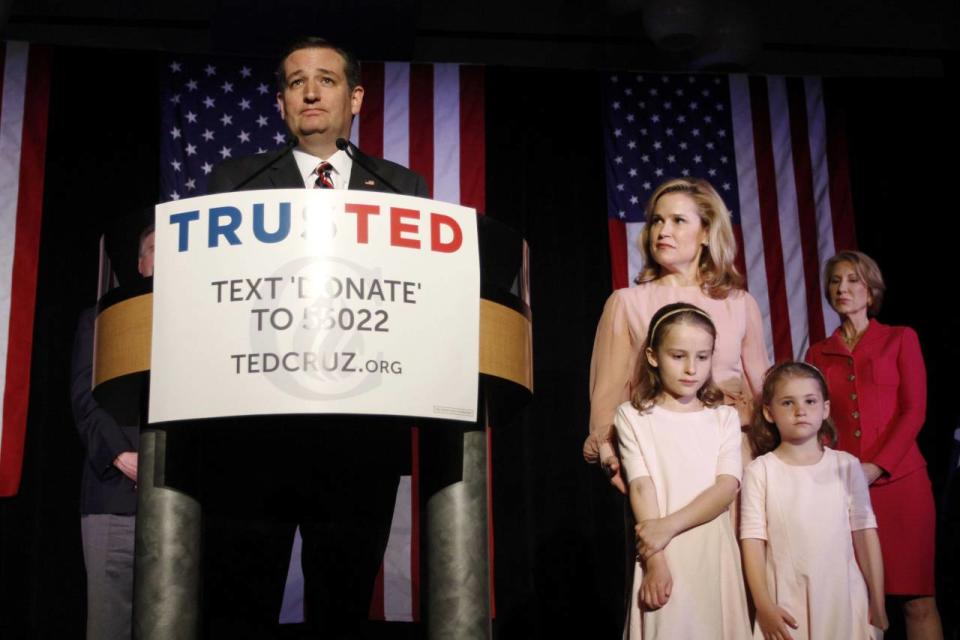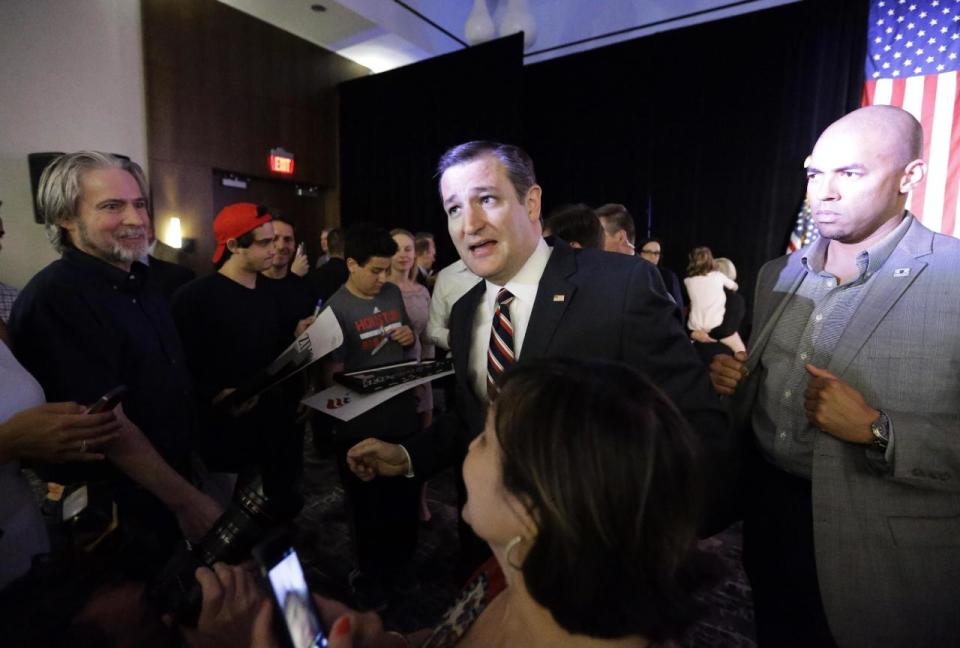Ted Cruz Day One: How feasible is his conservative checklist?
A Cruz presidency could set the United States on a very different trajectory within hours — if he can make good on his many promises for change on Day One.
Throughout his campaign, GOP presidential hopeful and Texas Sen. Ted Cruz has outlined the actions he plans to take on his first day in the Oval Office if he is elected president.
Mainstream America first heard this list during Cruz’s closing statement at this election cycle’s first Republican presidential debate, on Aug. 6.
“If I am elected president, let me tell you about my first day in office,” he said at the Fox News debate. The list included overturning President Obama’s executive orders, canceling the Iran deal and ordering the Department of Justice to investigate Planned Parenthood, among many other things.
Though extreme, these plans were somewhat drowned out by the sheer number of candidates crowding onto the GOP stage — and billionaire businessman Donald Trump’s braggadocio.
Cruz’s recitation of his Day One plans has become a staple in his speeches and town hall meetings, where he’s further fleshed out the list.
Now that the primaries have winnowed out most of last summer’s Republican contenders — only Cruz, Trump and Ohio Gov. John Kasich remain — it’s worth returning to Cruz’s plans.

Ted Cruz speaks during an election night party in Houston on March 15. (Photo: David J. Phillip/AP)
To discuss the likelihood that Cruz could actually deliver all he has promised, Yahoo News reached out to law professors Amanda Frost and Stephen Vladeck from American University Washington College of Law, and law professor Michael Gerhardt from the University of North Carolina School of Law.
“Legally, I think some of it is feasible. Practically, these are all going to be pretty darn heavy lifts for the first day,” Vladeck said. “A lot of the stuff he’s discussing are actions that the executive branch can pursue unilaterally, but probably not in 15 hours.”
Here’s the busy schedule Cruz set up for himself for his first day at 1600 Pennsylvania Avenue — and legal takes on whether these plans are doable.
Overturn Obama’s executive orders: Possible, but more difficult with established regulations — and not on Day One
“The first thing I intend to do is to rescind every illegal and unconstitutional executive action taken by Barack Obama.” (Aug. 6, 2015; GOP debate)
An executive order can overrule an executive order.
The law scholars agree that Cruz would be able to reverse or modify Obama’s executive orders under the Constitution. But practically speaking, it’s hard to change a law that’s already on the books.
“In theory, yes, a new president can reverse things that aren’t at the level of legislation that a previous president has done,” Frost said. “But in fact, there are a lot of bureaucratic hurdles that need to be jumped through.”
If an executive order resulted in some sort of formal regulation, Cruz would need to convince the agency that promulgated that regulation to go through a process of repealing or withdrawing it. This could happen fairly quickly, but it’s not likely to occur on Day One.
Order Department of Justice to investigate Planned Parenthood: Possibly illegal
“The next thing I intend to do is instruct the Department of Justice to open an investigation into these videos and to prosecute Planned Parenthood for any criminal violations.” (Aug. 6, 2015; GOP debate)
According to Gerhardt, the president of the United States is not allowed to direct particular prosecutions or investigations; the president can set policies and priorities or appoint people who share his or her values, but may not direct the DOJ to go after individuals or organizations.
“That is completely illegal. That is exactly one of the bases upon which Richard Nixon was impeached,” Gerhardt added. “The only president who really crossed that line was Richard Nixon, and look what happened.”
The Articles of Impeachment against Nixon include “interfering or endeavoring to interfere with the conduct of investigations by the Department of Justice of the United States” as one of the violations of his constitutional oath to faithfully execute the office of the presidency.
In short, Cruz would be able to ask his attorney general to investigate potential criminal activity, but he cannot compel him or her to bring charges.
“If the phone call is just ‘Hey, attorney general, do me a favor and take another look at the Planned Parenthood case,’ there’s nothing wrong with that,” Vladeck said.
Fight to end the ‘persecution of religious liberty’: Possible with some methods, illegal with others
“On day one, a President Cruz will instruct the Department of Justice, the IRS, and every other federal agency that the persecution of religious liberty ends today.” (Campaign website)
As is often the case with Cruz, the devil is in the details.
Just as with the previous plan, Gerhardt said, Cruz cannot direct the DOJ to look away from his political friends or toward his political enemies, but he could emphasize the importance of protecting religious liberty.
And if Cruz thinks a particular regulation infringes on religious liberty, he will run into the same problem he would with overturning Obama’s executive orders — namely, the Administrative Procedure Act, which dictates how the federal government establishes regulations. This could be a long process that would extend beyond his first day.
“If he thinks there are specific regulations, obviously statutes, or even things that go below the level of regulation but are guidance documents that guide the agency,” Frost said. “If he has a problem with any of those, those cannot be reversed by him on Day One. He could try to get the ball rolling.”

Cruz — with, from left, his daughter Catherine; wife, Heidi; daughter Caroline; and supporter and former rival Carly Fiorina at his side — reacts to the primary election results in Florida, Ohio and Illinois during a campaign rally on March 15. (Photo: Trish Badger/Reuters)
Cancel the Iran deal: There is domestic precedent for this, but it’s controversial
“On day one, a President Cruz will immediately repeal every word of President Obama’s dangerous Iran deal and will prioritize American national security interests in every instance.” (Campaign website)
Gerhardt, who is scholar in residence at the National Constitution Center, said there has historically been a dispute over whether a president can unilaterally nullify a treaty.
Though such moves are not without controversy, it is generally within the purview of the president to back out of international agreements. At the very least, there is historical precedent.
“It’s kind of interesting,” Gerhardt said. “It looks like Ted Cruz would like to do what Jimmy Carter did.”
In the late 1970s, President Jimmy Carter unilaterally nullified the Sino-American Mutual Defense Treaty, which the U.S. signed with China. Late conservative icon and Arizona Sen. Barry Goldwater filed a lawsuit against Carter, arguing the president could not break an international treaty without Senate approval. That case was dismissed.
No federal law would prohibit Cruz from backing out of an executive agreement like the Iran deal, but it could violate international law: the Vienna Convention on the Law of Treaties outlines accepted international standards on how a country can unilaterally back out of an international agreement.
“You couldn’t point to a federal statute or constitutional prohibition on him unilaterally backing out, but it might have both legal and diplomatic ramifications on the international scale,” Vladeck said.
Move the U.S. embassy in Israel to Jerusalem: Possible with international cooperation, but not on Day One
“A Cruz administration will on day one recognize Jerusalem as the eternal, undivided capital of Israel and the US embassy will be moved to Israel’s capital city.” (Campaign website)
A presidential administration could say that it wants to move the U.S. embassy, but it obviously would not be able to accomplish this unilaterally – consultation with international leaders, most notably the Israeli prime minister, would be necessary.
Get rid of Common Core: Not possible
“I’ve pledged to instruct the Department of Education on day one that Common Core ends today.” (Aug. 18, 2016; GOP Town Hall)
Responding to Cruz’s statement, Gerhardt said, “That won’t be necessary, because they [the Department of Education] don’t really have a role in it anyway.”
The president has almost no power over Common Core whatsoever, because it’s a state issue, not a federal issue. Common Core was put together by a compact of states, not by Congress. It’s not up to the Department of Education to tell states what to do about education.
“I would think Ted Cruz would, more than anything else, respect states’ rights and states’ sovereignty to make that choice themselves,” Gerhardt said. “No federal official has the power to tell our local schools, ‘you ought to be doing Common Core’ or not.”

Cruz is greeted by supporters in Houston during a March 15 election night party. (Photo: David J. Phillip/AP)
Strengthen the armed forces: Depends on what he means
“Another one of the most shameful things that, I think, of the last seven years is that we are sending our servicemen and women into combat with rules of engagement that have their arms tied behind their back. That [makes] it impossible for them to fight and defend themselves and win, I think that is immoral, it is wrong, and I will tell you this: I give you my word as commander in chief, that will end on Jan. 20, 2017.” (Feb. 18, 2016; GOP Town Hall)
A lot of whether Cruz can accomplish this depends on what he means when he says, “arms tied behind their back.” Cruz is suggesting that he will be a much tougher president and allow the U.S. armed forces to do what he feels must be done to succeed in war; in other words, as other GOP candidates have said, he does not want to wage a “politically correct war.”
The president does have some management over rules of engagement, but a lot of what troops may do depends on military and international law.
Crossing off items on this conservative checklist
In a way, the largest hurdles facing Cruz in enacting his agenda at all — not just on Day One — could be procedural rather than constitutional.
Frost said it is easy to make statements about what you would do once elected to the presidency, but that the procedural and administrative complexities of the government make changes challenging and slow.
“Most of what the president does is manage the administrative state,” she said, “and that is difficult for so many reasons, including the formalities of going through the Administrative Procedure Act to change things that are already law in the form of agency regulation. But in addition, [it is] getting all the people in a bureaucracy to do what you want them to do. And every president has that problem.”


